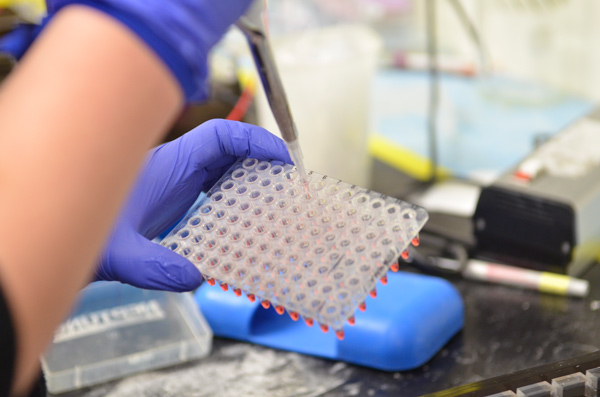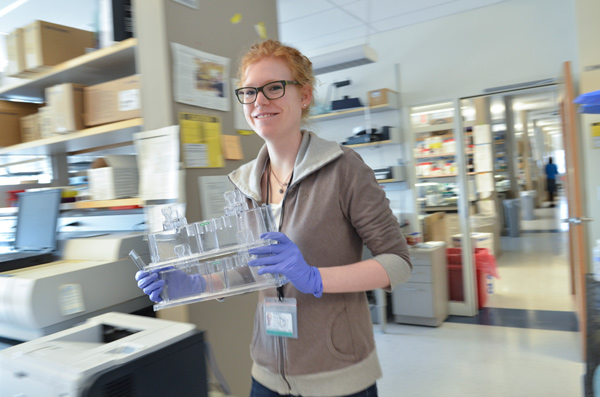ABOUT US
A History of Excellence
The excellence of our Graduate Program in Pharmacology and Molecular Medicine (PharMM) is illustrated by the fact that we held an NIH-sponsored pre-doctoral Training Grant from 1978-2024, one of the longest standing Pharmacology training programs in the country.
In 2004, the collective Health Sciences Schools and Colleges moved to the new state-of-the-art facilities at the new Anschutz Medical Campus in Aurora, CO. Along with the research and educational facilities are new clinical facilities for the University Hospital, the Children’s Hospitals, and the VA Hospital - creating a truly comprehensive clinical/translational campus. Tying many of the clinical and basic research aspects together is the newly-created Division of Personalized Medicine (and pharmacogenomics) that will facilitate the use of genomic information into clinical practice.
In September 2023, the Pharmacology program changed its name to Pharmacology and Molecular Medicine (PharMM) to better capture the breadth and impact of our training faculty's research and clinical work. What does molecular medicine mean to us? Molecular medicine is the integration of multiple disciplines within biology including Cancer Biology, Cardiology, Computational Biology, Neurobiology and Structural Biology to interrogate the molecular and genetic mechanisms that contribute to the etiologies that underlie disease, and to identify avenues for the future development of therapeutic interventions. Students enrolled in the PharMM Training Program will receive world-class training from faculty in one or more of these disciplines.
Program Highlights
Student Support
Students accepted in the PhD program are provided full tuition, health and dental insurance, and a stipend of $41,910 per year for living expenses. Continued support is contingent upon satisfactory academic and research performance by the student. When a student enters a thesis lab, the thesis mentor assumes complete responsibility for the student’s stipend, benefits, tuition, fees, and associated research costs.
The philosophy of our graduate program is to emphasize state-of-the-art research approaches at all stages of training; and, we begin with the recruitment phase. We identify candidates with excellent undergraduate academic credentials with a strong preference for those who have participated in substantive independent research. If you are a member of that select group and would like us to contact you, please let us know.
Mentoring
The administration of the program is managed by the Graduate Training Committee (GTC). The GTC is one of the most active committees in the department. The Committee administers all aspects of a student’s training, including student recruiters, individual program design, review and approval of laboratory rotation proposals, scheduling of the preliminary and comprehensive examinations, and selection of a thesis advisory committee. The Committee maintains an active role in overseeing the training in its entirety, making sure that curriculum, research experiences, and seminars provide an integrated and complete training experience. Entering students choose an advisor from the GTC to help guide them through their first year of training.
Current GTC members
- Mark L. Dell’Acqua, PhD, Chairman
- James Costello, PhD
- Jason Aoto, PhD
- J. David Port, PhD
- Mair E.A. Churchill, PhD
- Kate Smith, PhD
- Matthew J. Kennedy, PhD
- Tatiana Kutateladze, PhD
- Timothy McKinsey, PhD
Timeline
Rotations | During the first year in the program, students must complete three 10-week formal laboratory-based research rotations. Students select rotation advisors from the current pool of 40+ training faculty with research interests across a broad spectrum of pharmacological sub disciplines including neurobiology (from behavior to ion channel biophysics), cancer, cardiovascular & pulmonary, cell signaling, epigenetics, molecular structure, and bioinformatics. Each research rotation is intended to examine testable hypotheses, as well as to provide exposure to new laboratory techniques. At the conclusion of each rotation, each first-year student presents a seminar to the Program membership.
Seminars and Journal Clubs | To enhance research exposure further, the Program offers a special course to first year students called Frontiers in Pharmacology with the intent of conveying the scope contemporary pharmacological research. There is also a weekly seminar series shared between the Pharmacology Department and the Program as well as a journal club for students.

